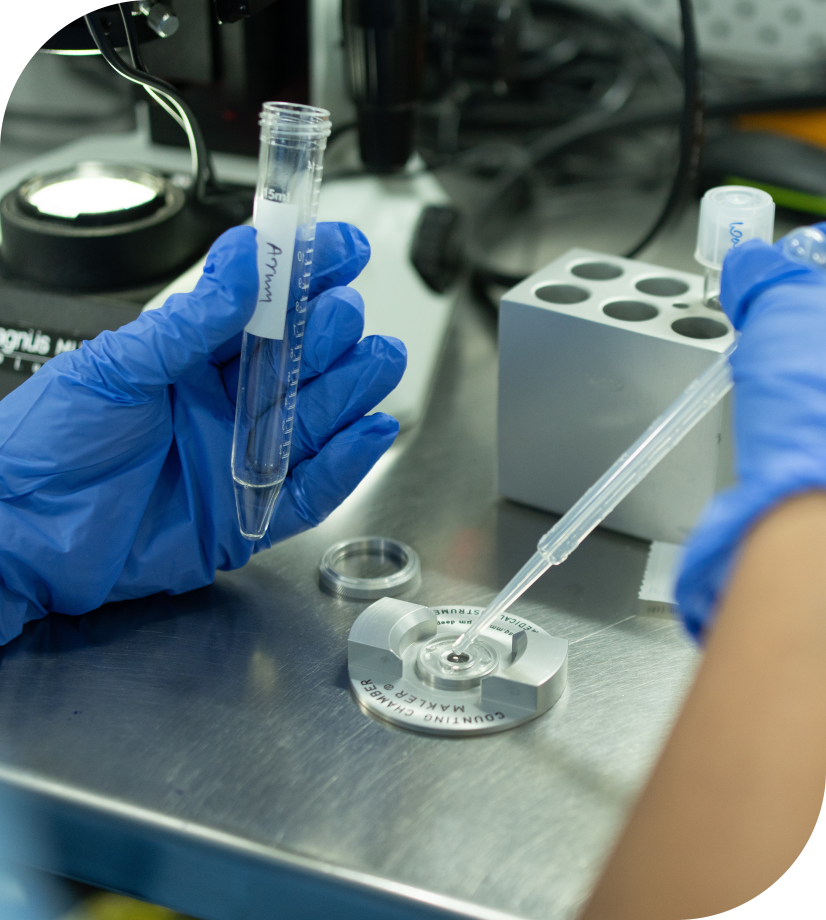HORMONE DIAGNOSTICS LAB

At our fertility centre, accurate diagnostics form the cornerstone of effective fertility treatment. Our in-house Hormone Diagnostics Laboratory is fully equipped with the latest technology to deliver rapid, reliable, and detailed assessments of reproductive health. By providing both hormonal testing, we ensure streamlined evaluation, faster results, and highly personalized treatment protocols.
Decoding Reproductive Health
Hormonal balance plays a critical role in conception. Our Hormone Diagnostics Lab offers comprehensive hormonal testing for both women and men, enabling us to uncover the root causes of infertility and guide precise interventions.
We evaluate a wide range of hormones essential for reproductive function, including:
- Follicle Stimulating Hormone (FSH)
- Luteinizing Hormone (LH)
- Estradiol (E2)
- Anti-Müllerian Hormone (AMH)
- Progesterone
- Prolactin
- Thyroid Profile (TSH, T3, T4)
- Testosterone and DHEA
For women, these tests help assess ovarian reserve, menstrual irregularities, PCOS, and ovulatory function. In men, they support the evaluation of sperm production and endocrine-related fertility issues.
Our lab utilizes automated immunoassay analyzers and advanced chemiluminescence technology, ensuring high sensitivity, reproducibility, and quick turnaround times. Real-time reporting allows clinicians to make swift, informed decisions for time-sensitive fertility treatments like IVF or IUI.
Integrated Diagnostics for Tailored Treatments
One of the key advantages of our in-house diagnostics is the integration between hormone testing, semen analysis, and clinical consultation. Our fertility specialists collaborate closely with lab experts, reviewing reports in real-time to tailor the most effective treatment path. This synergy eliminates delays, improves communication, and allows for dynamic adjustments during a patient’s treatment cycle.
- In Summary, our Hormone Diagnostics Lab are designed to provide fast, precise, and holistic evaluations of both male and female fertility. By combining state-of-the-art technology with rigorous protocols and expert staff, we ensure a solid foundation for accurate diagnosis and successful outcomes. Our commitment to quality diagnostics is central to offering every couple the best chance at parenthood.

FAQs
What is a hormone diagnostics lab and how is it used in fertility treatment?
A hormone diagnostics lab is a specialized facility that analyzes reproductive hormone levels such as AMH, FSH, LH, estrogen, and progesterone. These hormone tests are essential for evaluating fertility health and planning personalized IVF or IUI treatments.
Which hormone tests are commonly done in a fertility hormone lab?
Key hormone tests include Anti-Müllerian Hormone (AMH), Follicle-Stimulating Hormone (FSH), Luteinizing Hormone (LH), Thyroid Stimulating Hormone (TSH), Estradiol (E2), and Progesterone. These tests help assess ovarian reserve, ovulation, and overall reproductive health.
Why is AMH testing important in a fertility hormone lab?
AMH (Anti-Müllerian Hormone) test is a high-accuracy marker for ovarian reserve. It helps fertility specialists determine the quantity of eggs remaining, making it a key test before starting IVF or other fertility treatments.
When should hormone levels be tested during the menstrual cycle?
Most hormone levels are tested on day 2 or 3 of the menstrual cycle to evaluate baseline reproductive health. Progesterone is typically checked around day 21 to confirm ovulation during a 28-day cycle.
Can hormone imbalance be detected in a diagnostics lab?
Yes, hormone diagnostics labs detect imbalances such as PCOS, thyroid disorders, or low progesterone, which may affect fertility. Early detection through hormone testing allows timely medical intervention.
How accurate are hormone tests for infertility?
Fertility hormone tests conducted in accredited hormone labs are highly accurate and essential for diagnosing conditions like diminished ovarian reserve, premature ovarian failure, or anovulation.
Do men also require hormone testing in fertility diagnostics?
Yes, hormone testing in men evaluates testosterone, FSH, and LH levels. These tests help identify low sperm production, hormonal imbalances, or testicular function issues that affect male fertility.
What’s the role of a hormone diagnostics lab in IVF and IUI planning?
Hormone labs provide vital data that guides IVF or IUI protocols. By assessing hormone levels, fertility specialists can customize stimulation protocols, monitor response, and time procedures for the best success rates.
